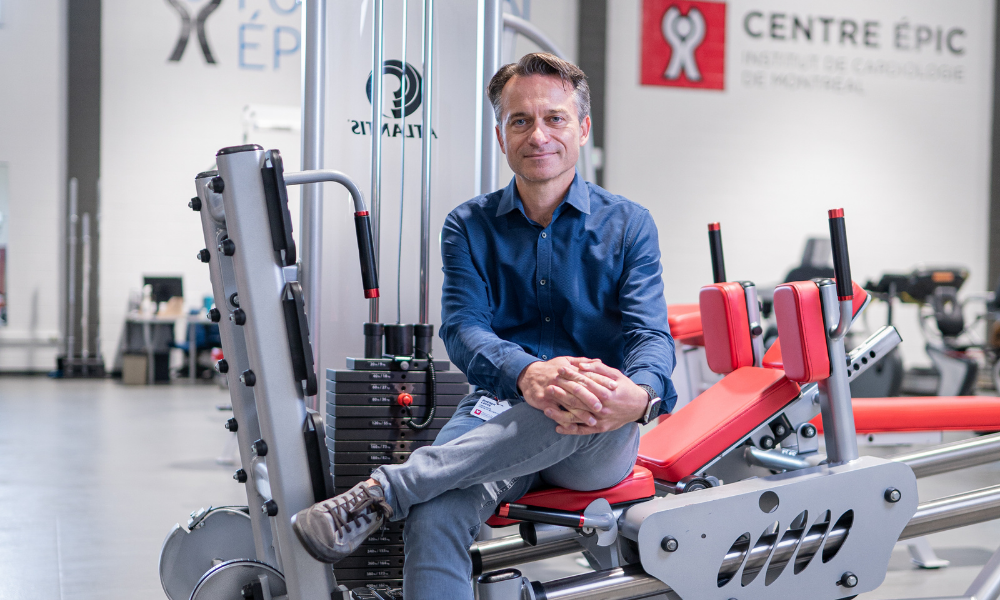Cardiovascular prevention to counteract cognitive disorders
Foundation, in collaboration with Dr. Louis Bherer, neuropsychologist at the Montreal Heart Institute
Home > Blog > Cardiovascular prevention to counteract cognitive disorders
The brain and the heart: in literature these two organs are supposedly opposed to each other, which gives rise to great internal strife. In the field of health, however, they form an inseparable duo . Dr. Louis Bherer, neuropsychologist at the Montreal Heart Institute, is interested in prevention measures that act in synergy on these two central motors.
The heart and the brain: two closely connected organs
When we speak of cognitive health, the heart quickly appears in the conversation. Why are the heart and brain so closely connected? Dr. Bherer explains their relationship: “The brain is a big consumer of energy. The blood that circulates in the body is largely used to feed the brain because of how greedy it is.”
With our aging population, cognitive disorders are more frequent than before, and cardiovascular risk factors and heart disease are often at the source of these problems.
Cardiovascular risk factors and cognitive health: communicating vessels
Information collected by researchers at the Centre ÉPIC about the populations studied reveals the concrete impact of cardiovascular risk factors on cognitive health. This valuable data guides neuropsychologist Louis Bherer’s research.
“People with important risk factors associated with cardiovascular health (obesity, smoking, high blood pressure, diabetes, etc.) have lower scores on memory, mental speed, and decision-making, which can impact tasks as simple as starting to drive when a light turns green.”
Cognitive decline accelerated by a heart attack
Cognitive impairment does not evolve evenly over the years. For example, its impact is felt more deeply after a cardiac event or the detection of coronary heart disease. “As soon as the disease appears, we see a steeper decline in overall cognitive functioning, verbal memory, semantic memory, and spatial orientation, which are important cognitive functions in our lives. Memory is a person’s identity.”
Cardiovascular prevention as a solution to cognitive decline
Faced with the proven links between cognitive health and cardiovascular health, Dr. Bherer is optimistic. This discovery is a valuable opportunity to take action and move into solution mode.
“Having a healthy brain is possible. Neurologists believe it’s possible to reduce incidences of dementia by 30 to 40% by adopting preventative lifestyle choices.”
Healthy lifestyle habits for a healthy heart and brain
It’s possible to have a healthy brain and heart by working on two fronts at the same time: the interventions on modifiable factors that help prevent cognitive disorders are the same as those that help maintain good cardiovascular health. Balancing diabetes, quitting smoking, reducing obesity, and being physically active are all positive behaviours that have a direct impact on the heart and, indirectly, on the evolution of neuropathologies.
An anti-inflammatory diet and physical activity: a most effective duo
In the category of healthy lifestyle habits, nutrition and sports are the grand champions. The Montreal Heart Institute’s Prevention Watch suggests, among other things, that an anti-inflammatory diet in which fruits, vegetables, and whole grains are given pride of place helps reduce the risk of dementia considerably. Dr. Martin Juneau, cardiologist and director of prevention at the Montreal Heart Institute, also touts the benefits of the Mediterranean diet for cardiovascular health (link in French).
The same is true with regard to regular physical activity: certain studies suggest that at the age of 80, a person who keeps in shape can have a V02 max (cardiorespiratory capacity) equivalent to that of a 50-year-old sedentary person.
“You don’t have to run a marathon. Ten to 15 minutes of physical activity per day is enough to have an effect on your quality of life, cognition, memory, and executive functions.”
The example of Gérard Lavoie: 100 years old and 100% alert
There are many testimonials and tangible proof that it’s possible to age in good cognitive health (link in French). In December 2021, a report about 100-year-old Gérard Lavoie published in Le Soleil showed a happy and still active accountant, still juggling with numbers.
“We now know that people who adopt a healthy and active lifestyle after age 60, and who are disciplined, will greatly improve their quality of life,” concludes Dr. Bherer. So to maintain our mental alertness, there is no sweeter medicine than good fresh food and a few laps in the pool!
At the Montreal Heart Institute, research funding can change the lives of millions of people struggling with cardiovascular disease, here and elsewhere. We are as advanced as we are today thanks largely to the support, generosity, and loyalty of the Foundation’s donors. Thank you for supporting us in this quest for solutions that improve the health of the population.
donate today









